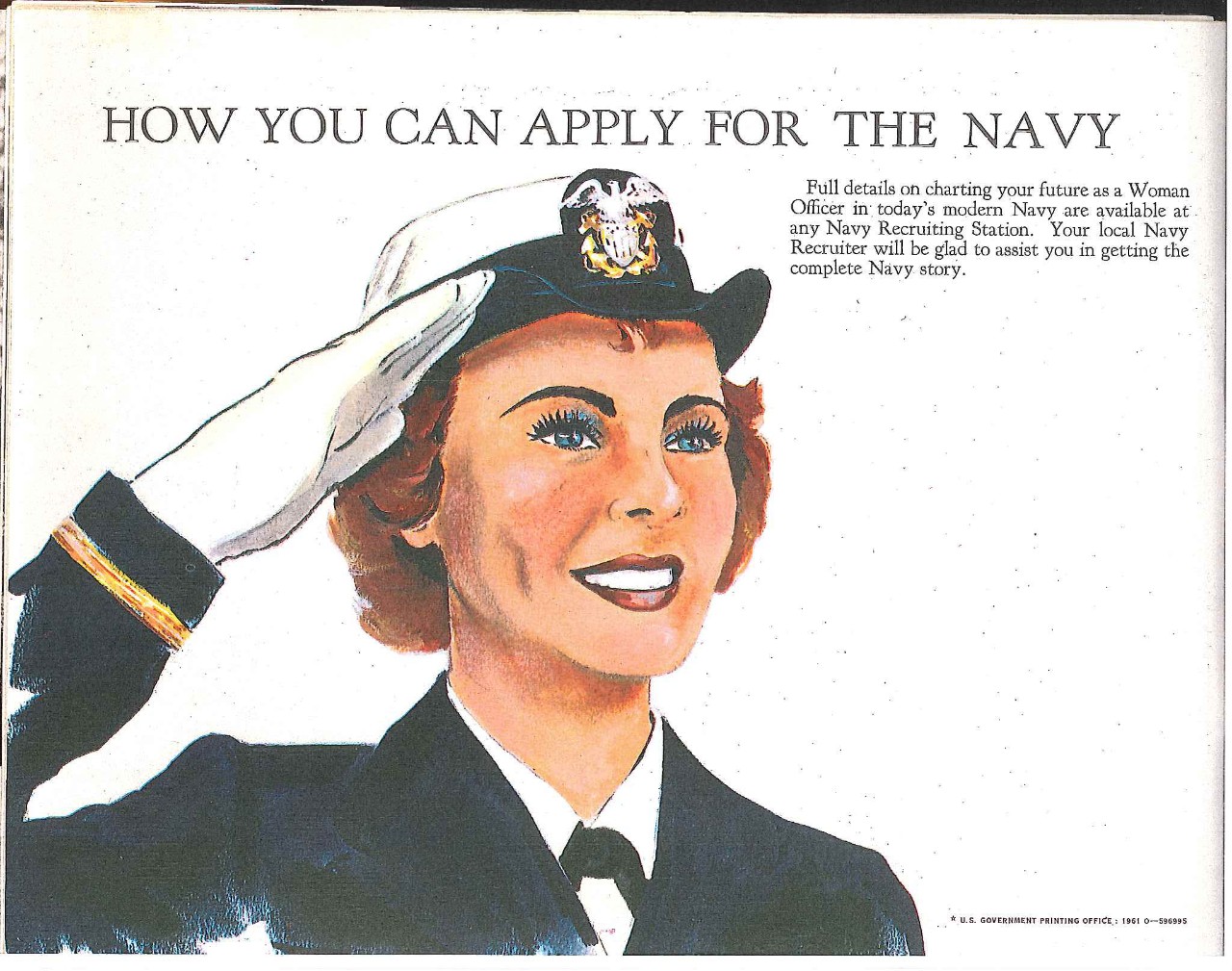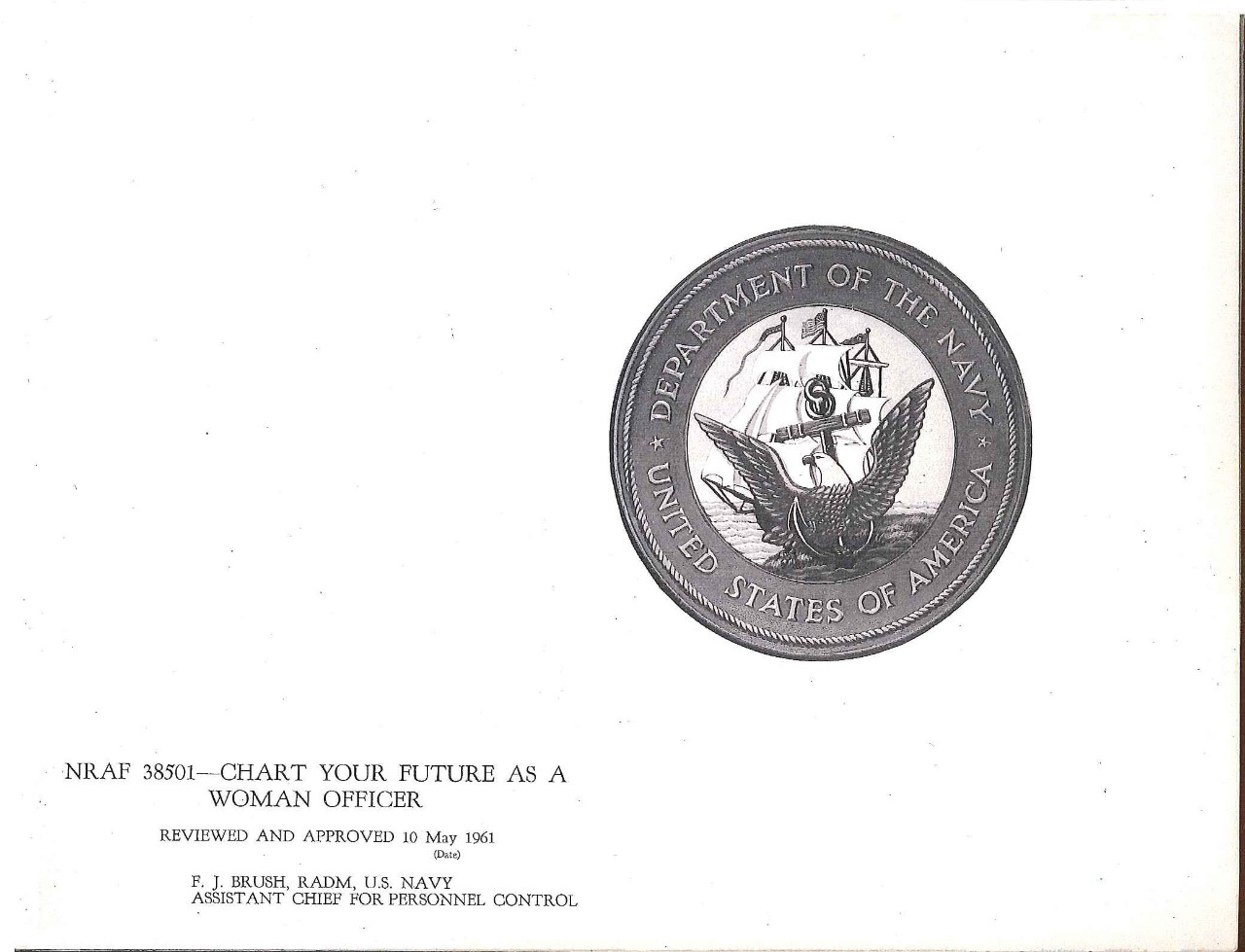
The Navy Department Library
Chart Your Future As A Woman Officer

PDF Version [10MB]
Charting Your
YOUR FUTURE…what will it hold? A full, rich life of accomplishment or a succession of false starts? A challenging career in which you work with dedicated men and women toward an important goal?
The most vital decisions in your life are those concerning your career. You have already given it thought. In selecting your college courses [sic] you have headed toward a career field. You have built a firm academic foundation and developed your natural talents. How are you going to use them? Now is the time to chart your future.
Naturally, you are seeking a career of which you can be proud; where there is the thrill of being part of a great and honored institution, and the assurance that your diligence and devotion will be recognized and rewarded.
AS A COLLEGE GRADUATE, you may be eligible for appointment as an officer in the U.S. Navy. Your education has developed initiative and a sense of responsibility. Because of these qualities, the Navy offers you a career as a patriotic and responsible citizen doing a job vital to our nation's security.
Working with Navy men at home and abroad, American women are contributing a full share to the security of their countrymen…and of all those, the world over, who look to the United States as the guardian of man's dignity, freedom and peace.
They serve with honor, with prestige and with pride.
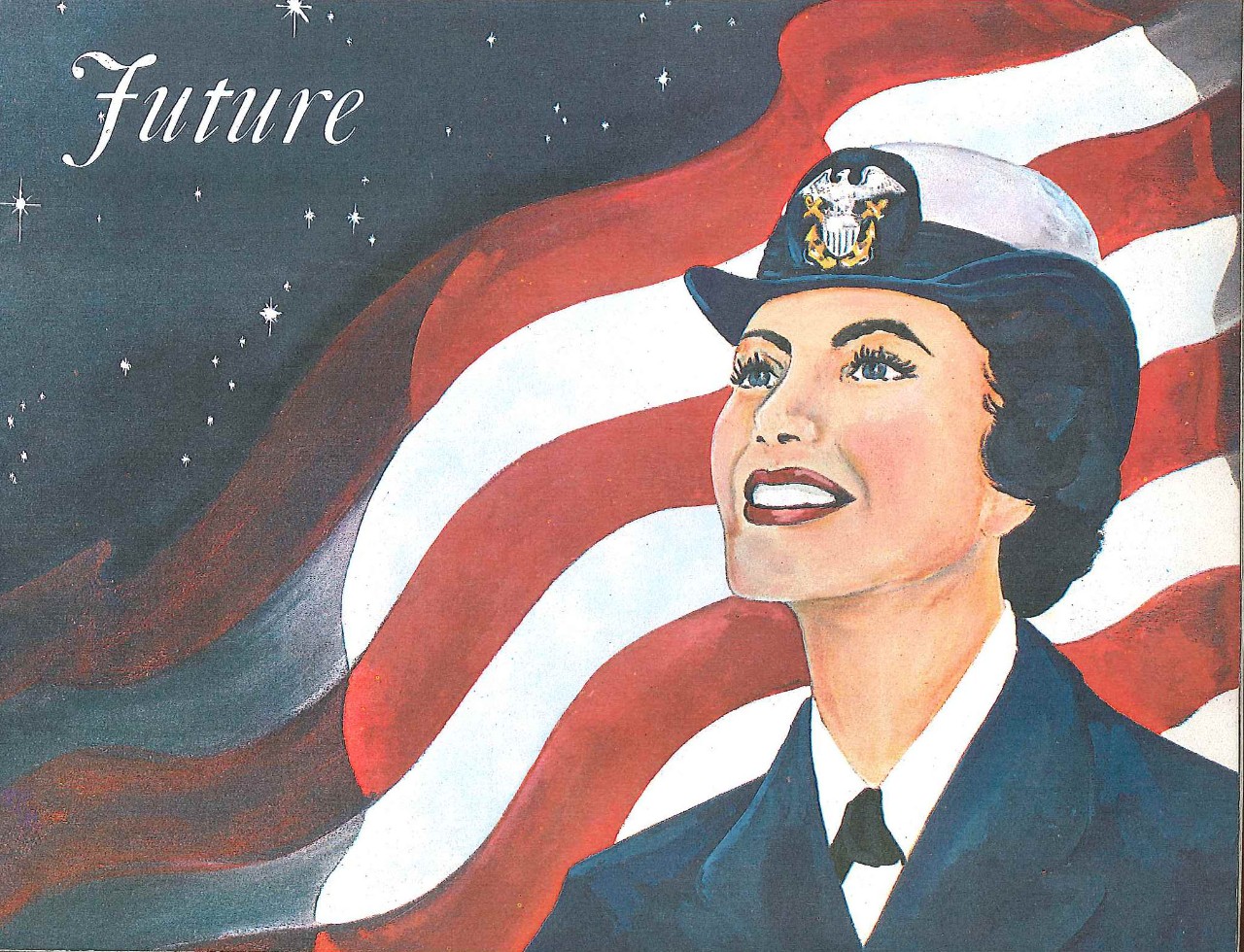

YOUR NAVY CAREER
A GREAT DAY DAWNS. For the first time your mirror reflects the gleaming gold stripe that proclaims you an officer in the U.S. Navy.
Ahead lies your first assignment. You have completed the course at the U.S. Naval School for Women, Officers, at Newport, R.I., and have been commissioned an ensign. You have learned much about the Navy and its procedures, and are confident of your ability to meet the tests of the future. You know that your first assignment has been carefully selected for you. It will make good use of your aptitudes, interests, and education. It will be stimulating to you, and important to the Navy's mission.
YOUR DUTIES AND OBLIGATIONS will be similar to those of male officers, and your tenure equally assured. Your first duty station will be somewhere within the continental limits of the United States. Normally, it covers a 2- to 3-year period. Here, you find that your Navy career offers challenging work, a wide variety of social events, cultural development and good companionship. The spiritual guidance of a Navy chaplain of your faith gives you the sense of security that rounds out a fascinating life. The excellent pay and allowances of your rank will enable you to live graciously wherever your career may lead.
As you apply your Navy training to the tasks at hand, you find that your willingness to accept the challenge of leadership to those serving under your direction brings out the qualities of initiative, loyalty and devotion to duty so essential to the naval officer. You are pleased to know that you have these qualities. They are the ones that qualify you for greater responsibility and promotion.
YOU ARE EXPECTED to state your preferences as to location of new duty station when your stateside tour is finished. Insofar as the needs of the service permit, consideration is always given to your desires. You may be considered for an overseas assignment. Perhaps you'll find yourself working and sightseeing in Paris, London, Naples, or Tokyo. Or vacationing on the Riviera, Capri, or Waikiki. The opportunity to travel is one of the lures of Navy life. As time passes you will appreciate more and more the privilege of serving your country as a naval officer.
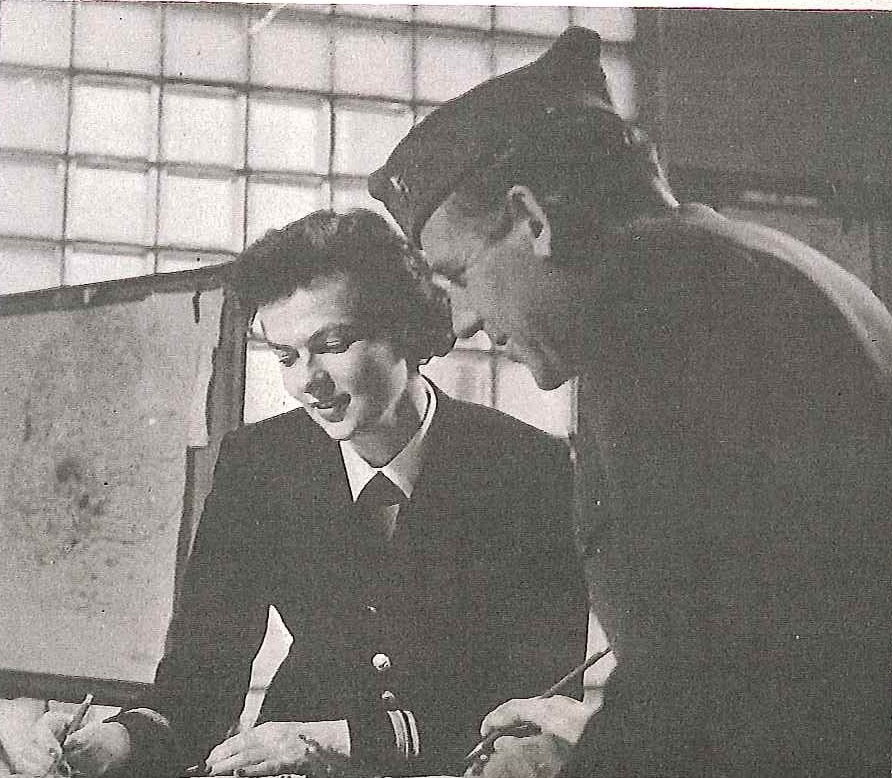
WOMEN LINE OFFICERS
As a line officer your assignment may be:
PERSONNEL ADMINISTRATION
Recruiting—Careful selection of personnel for Navy service.
Classification—Insuring [sic] that every Navy man and every Navy woman is assigned to the job that can best utilize his or her particular talents.
Supervision—Guidance of enlisted personnel both as individuals and groups in job areas and services.
Management—Administrative departments and development of efficient business methods and office procedures. These assignments sharpen your executive skills.
EDUCATIONAL FIELDS
Navy professional schools present the broadest possible training from basic indoctrination in the ways of the Navy through postgraduate instruction dealing with the advanced techniques and skills of our technological age. These specialized fields of particular interest to the women officers range from short courses in Public Information (6 weeks) to postgraduate courses in Personnel Administration and training, Comptrollership, Intelligence, Languages, Aerology, and Management. Not only do women officers attend these schools, but they serve on their staffs as instructors and in other capacities.
NAVAL OPERATIONS
Women officers serve in naval operations at Ships Movement Report Centers, and with the Military Sea Transport Service. They work in naval intelligence, research analysis, and communications. They supervise cryptographic processing of messages, train and supervise communications personnel, and assume responsibility for the security of registered publications.
WELFARE AND RECREATION
The importance of leisure time activities of naval personnel cannot be overemphasized. Women officers in this field supervise the welfare and recreation programs on naval stations, including the direction of service clubs, the management of organized athletic programs, and the administration of hobby and craft shops and station libraries.
PUBLIC INFORMATION
Keeping the public informed about the Navy through the press, radio, television and motion pictures is the job of public information officers. They write and edit publications, gather technical information, write speeches, prepare copy for press, radio and television and prepare copy and layout for posters, booklets, brochures and magazines.
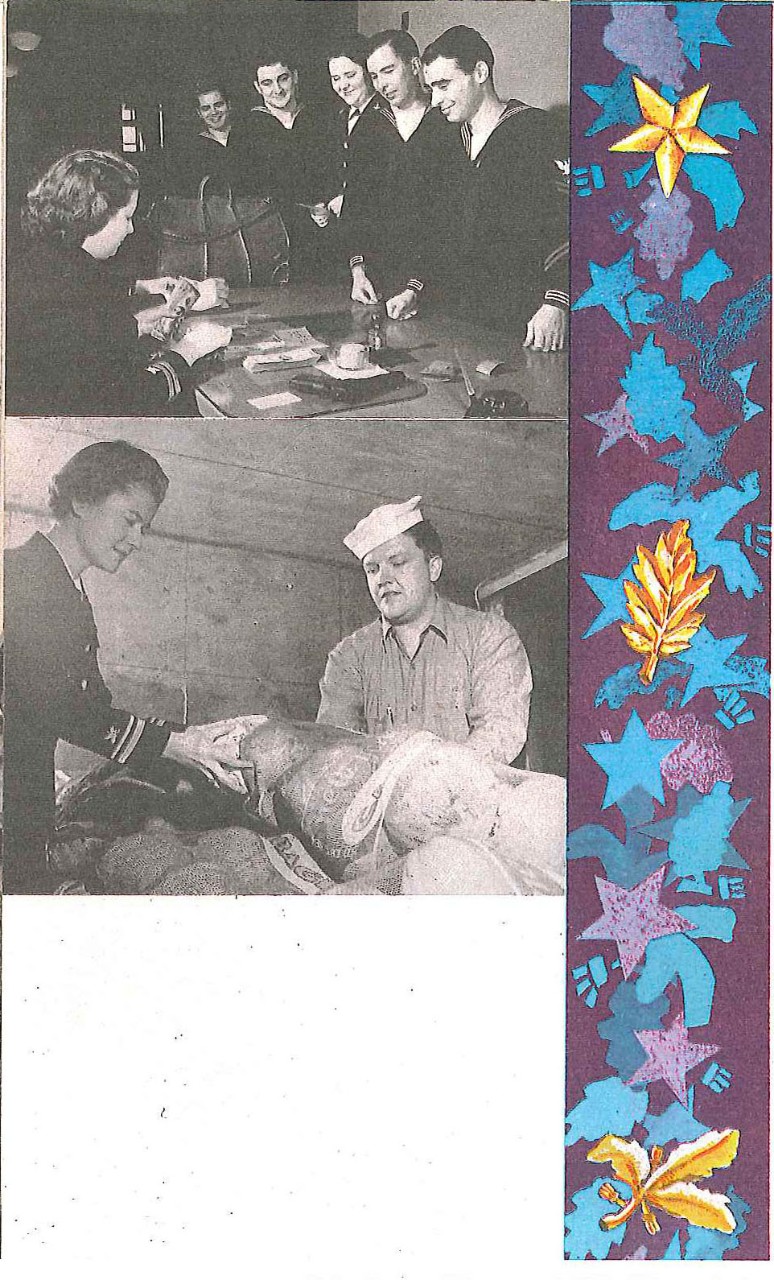
Supply Corps officers are staff officers. They watch the purse strings in the vast field of Navy finance, purchase the tremendous quantities of food and supplies, and arrange for its transportation to Navy units all over the world. Following basic indoctrination at Newport, Supply Corps officers complete a 26-week course at the Navy Supply Corps School in Athens, before assignment to duty at a Navy academy.
Your assignment as a Supply Corps officer may be in:
FINANCE
This includes the coordination, review and allocation of funds; the control of expenditures, and all phases of disbursement and accounting for public funds, including that important semi-monthly pay check [sic].
PROCUREMENT
The purchasing and expediting of materials and equipment from private industry to Navy use, and the establishment of purchasing policies and procedures. This is business on a huge scale and gives supply officers unusual experience.
RETAIL MERCHANDISING
Navy Exchange stores are managed in accordance with the most modern merchandising methods and policies under the supervision of the Supply Corps. Officers receive specialized training in retail merchandising at naval supply activities, Brooklyn, N.Y., before assignment to Navy Exchange management.
INVENTORY CONTROL
The efficient administration of Navy supply activities requires streamlined and accurate control of inventory and maintenance of adequate stock levels. This is done under the direction of Supply Corps officers. It is one of the key functions that helps make Navy supply the outstanding operation it is.


MEDICAL SERVICE CORPS
Following basic indoctrination at Newport, Medical Service Corps officers are assigned to naval hospitals and dispensaries at home and overseas, and to the Navy's hospital ships at sea. These officers form an important part of the Navy's patient care team and have the finest facilities and equipment at their disposal.
The Navy conducts a continuing research program in medicine in an effort to discover preventive measures and treatments for a variety of medical problems. Medical Service Corps officers may be assigned to research projects in their specialties. Their duty assignments will be in their specialties, but successive changes in duty provide excellent opportunities to practice in different phases of the field.
Your specialty in the Medical Service Corps may be:
DIETETICS
Navy dieticians plan diets for hospital patients which include calculating special and metabolic diets prescribed by medical officers; plan daily menus insuring [sic] proper diet and nutritional balance; requisition food and other supplies; supervise and train assigned personnel, and [sic] instruct patients in correct food and dietary habits.
PHYSICAL THERAPY
Day after day, work goes on in naval hospitals helping handicapped service personnel regain their health with the aid of physical therapy. Naval medical facilities are supplied with the finest and most modern equipment available for physical therapy treatments such as hydrotherapy, electrotherapy, and mechanotherapy.
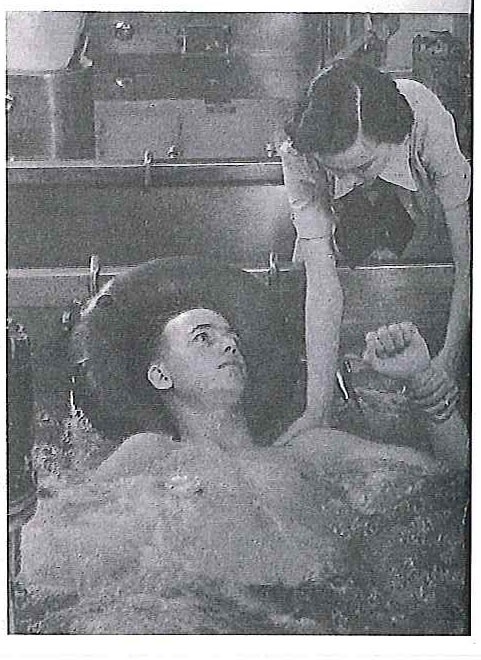
CORPS
OCCUPATIONAL THERAPY
As an occupational therapist under the direction of skilled Navy medical officers, you will conduct rehabilitation programs aimed at helping the sick and injured along on their way back to useful lives. You will direct and supervise therapeutic activities including weaving, painting, potterymaking [sic], radio repair, metal working, leather working, carpentry, and other craft work.
OPTOMETRY
Optometrists conduct external examination of eyes and their appendages; determine by meansof [sic] ophthalmic instruments the sight abnormalities which may be improved by use of lenses, prisms, or other ophthalmic devices; prescribe glasses or orthoptic training when necessary, and refer patients requiring medical treatment or surgery to an ophthalmologist.
PHARMACY
Pharmacists direct activities of the pharmacy at Navy medical activities; supervise compounding and dispensing of prescriptions and drugs, manufacturing pharmaceutical and stock preparations, inspecting dated drugs for potency, issuing narcotics and other controlled drugs, and requisitioning drug supplies. In addition, they advise medical officers on pharmacology and effects of drugs.
MEDICAL ALLIED SCIENCES
The Medical Service Corps includes specialists working in such fields as bacteriology, biochemistry, biophysics, chemistry, entomology, industrial hygiene, parasitology, physiology, physics, psychology (clinical and experimental), public health, radiobiology, radiochemistry, radio-physics, serology, and virology.
SUPPLY AND ADMINISTRATION
Officers of this specialty perform duties in correlation with medical department administration and logistics. They serve in naval hospitals and other medical and dental activities.


MEDICAL CORPS
WOMEN PHYSICIANS practice side by side with the men of the Medical Corps in naval hospitals, dispensaries and other medical activities the world over. They are concerned with the whole range of medical problems which the human body presents. Surgery, psychiatry, internal medicine—radiology, anesthesiology, pathology—and all the other medical services are represented on the staffs of our great naval hospitals.
Clinical training, extending to certification by a specialty board, research, and oversea assignments offering an opportunity to delve into realms of medicine which cannot be explored in this country, are open to medical officers.
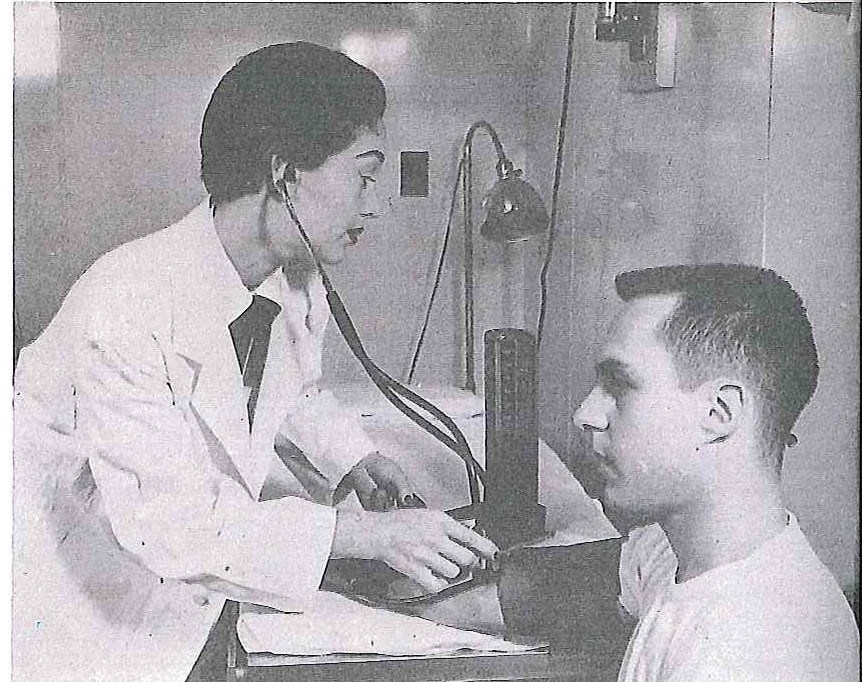

WINNING YOUR NAVY COMMISSION
YOUR FIRST THOUGHT of a Navy career came, perhaps, as it does in many cases, when a naval officer gave a talk on the subject during your junior or senior year at college. Little things reminded you of the Navy from time to time, and one day you decided to look into the matter. What you learned sounded good, and you talked it over with your college counselor. She thought you had the qualifications. Finally, when you were sure, you talked it over with your parents. They gave their consent and approval.
The next step was to apply for officer training. You called at the local Navy Recruiting Station and asked how you went about it. It turned out to be very simple. The Recruiting Officer took your name, address, telephone number, and a few vital statistics concerning age, education and general state of health. He gave you some booklets on a naval officer's career, and [sic] said a woman officer would call you soon for an interview. She phoned the following day and made an appointment for the first of a series of interviews, tests, and a physical examination that resulted in your order to report to the U.S. Naval School, Officer (Women), in Newport. A few weeks after graduation, you were on your way. At Newport, you found that the Women Officers' School is one of many at this historical naval base on the beautiful shores of Narragansett Bay. The Naval War College, where the most promising officers of the Navy are trained for high command, is also at Newport.
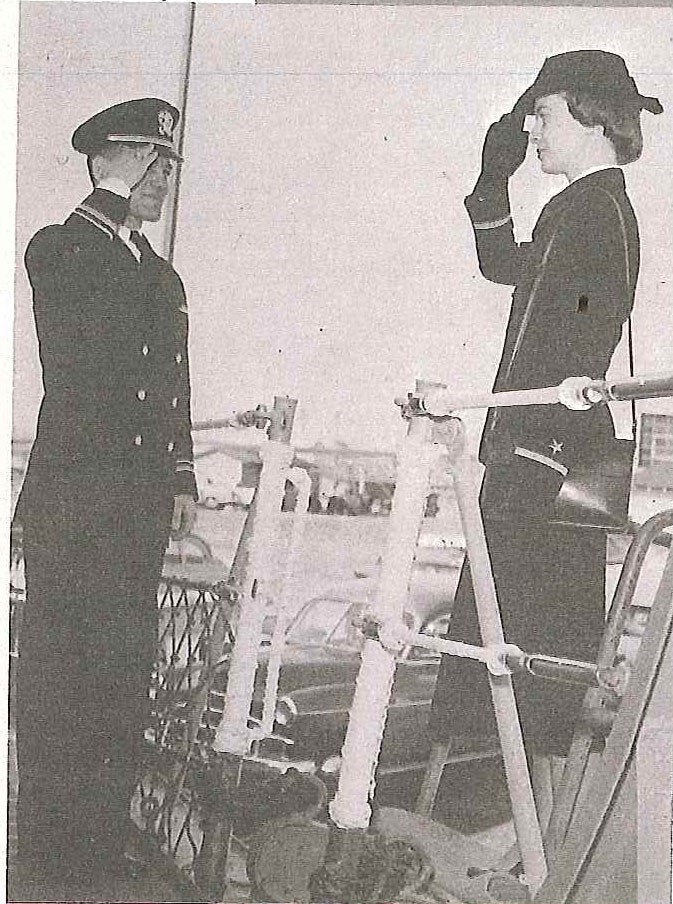
JUST AS IN COLLEGE, your first day was devoted to registration and settling down. You drew your school uniforms, and [sic] were measured for your officer uniforms—to be donned on Commissioning Day. You were checked out on your "shots" at the dispensary, and [sic] found to be right up to date. Your quarters were well-furnished, attractive, and comfortable. You met other officer candidates and started friendships you will treasure all your life.
WHEN YOU READ over your class schedule and saw the subjects you were to study, you wondered if 16 weeks of training would be enough to prepare you for a Navy career. Study of the Navy, its global mission, its traditions and customs, its personnel procedures; the ships, aircraft, and weapons with which it carrier out its mission as the Nation's first line of defense, all were so new to you and seemed so much to learn in so short a time.
As your training progressed these fears faded. You had the academic foundation, the study discipline, and the ardent desire to become an efficient naval officer. The Navy had the training know-how. Detail by detail it all fell into place, and you grasped the sweeping scope of this great service. With understanding of the Navy's mission [sic] you appreciated the value of teamwork. It is plainly apparent, now, that your individual effort is an integral part of the complex operation of this great organization. Every step is important. You have an important role.
SUCCESSFUL COMPLETION of your first eight weeks led to the commissioning ceremony. With your classmates you raised your right hand and took the Oath of Office. It was an impressive moment as you repeated:
I DO SOLEMNLY SWEAR THAT I WILL SUPPORT AND DEFEND THE CONSTITUTION OF THE UNITED STATES AGAINST ALL ENEMIES, FOREIGN OR DOMESTIC; THAT I WILL BEAR TRUE FAITH AND ALLEGIANCE TO THE SAME; THAT I TAKE THIS OBLIGATION FREELY, WITHOUT ANY MENTAL RESERVATION OR PURPOSE OF EVASION, AND THAT I WILL WELL AND FAITHFULLY DISCHARGE THE DUTIES OF THE OFFICE ON WHICH I AM ABOUT TO ENTER; SO HELP ME GOD.
The gold stripe on your sleeve gains new meaning. You are now an officer in the United States Navy.
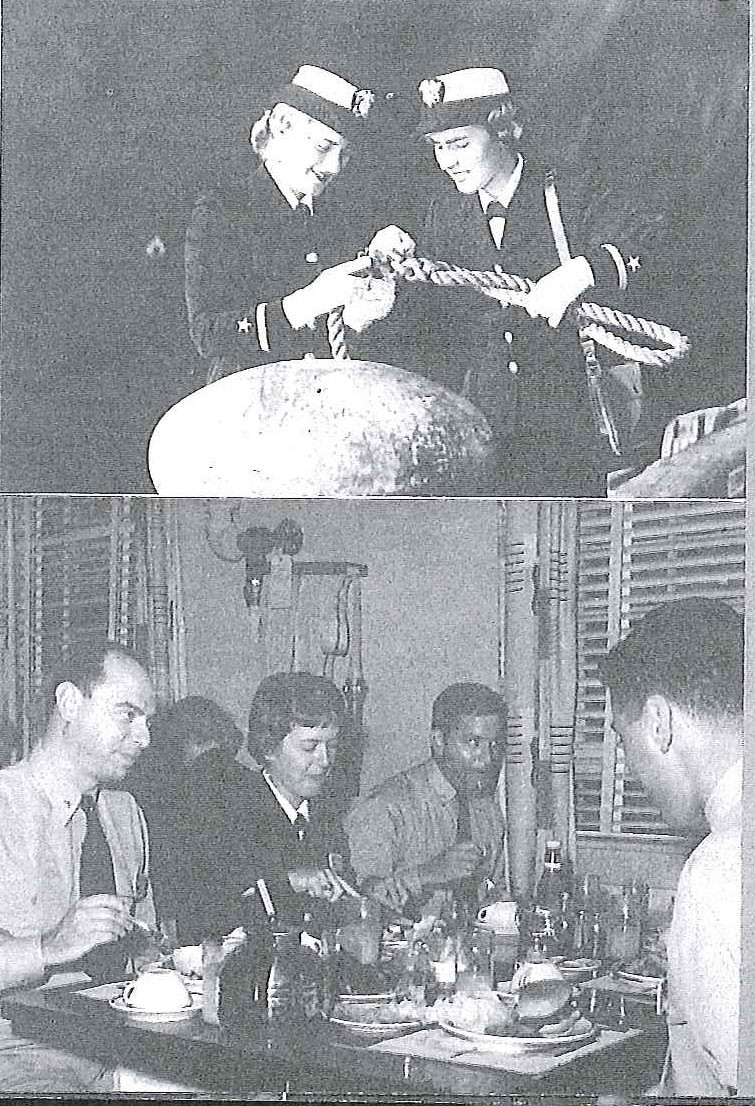
UNDER WAY AS A NAVAL OFFICER
THE NEXT 8 WEEKS of your schooling is devoted to officer indoctrination. You have gained a great deal of knowledge, now you will learn to apply it. Your classroom work continues with courses in administration, communications, the Uniform Code of Military Justice, basic psychology, and naval leadership. Between classroom presentations you are taken on trips to the naval air base at nearby Quonset Point, to the submarine base at New London, Conn., to naval hospitals and installations in the Boston are for on-the-scene familiarization.
This part of your training completes the transition from civilian to Navy life. You meet ships officers aboard aircraft carriers, cruisers, destroyers, and submarines during their working hours. You meet the pilots and other officers of the naval aviation squadrons, and learn about their duties. In your leisure time at the officers' club and the mess, you enjoy club dances and participate in the recreational programs. You are accepted by all, made welcome in the Navy.
GRADUATION DAY ARRIVES. Your family has come to Newport for the ceremony. You are aware of a new stature in their eyes. Young brother is slightly awed. Sister is agog, eager to hear everything about the Navy and Navy life. Mother and Dad knew you would make it, but that doesn't lessen their pride in your achievement. This is a big day for them.
You are impressed by the number of your newly met officer friends who attend the ceremony. The realization that they have found time in their busy schedules to be on hand for the big moment brings home to you the sense of comradeship that pervades the Navy. Wherever your career leads, you will be among friends.


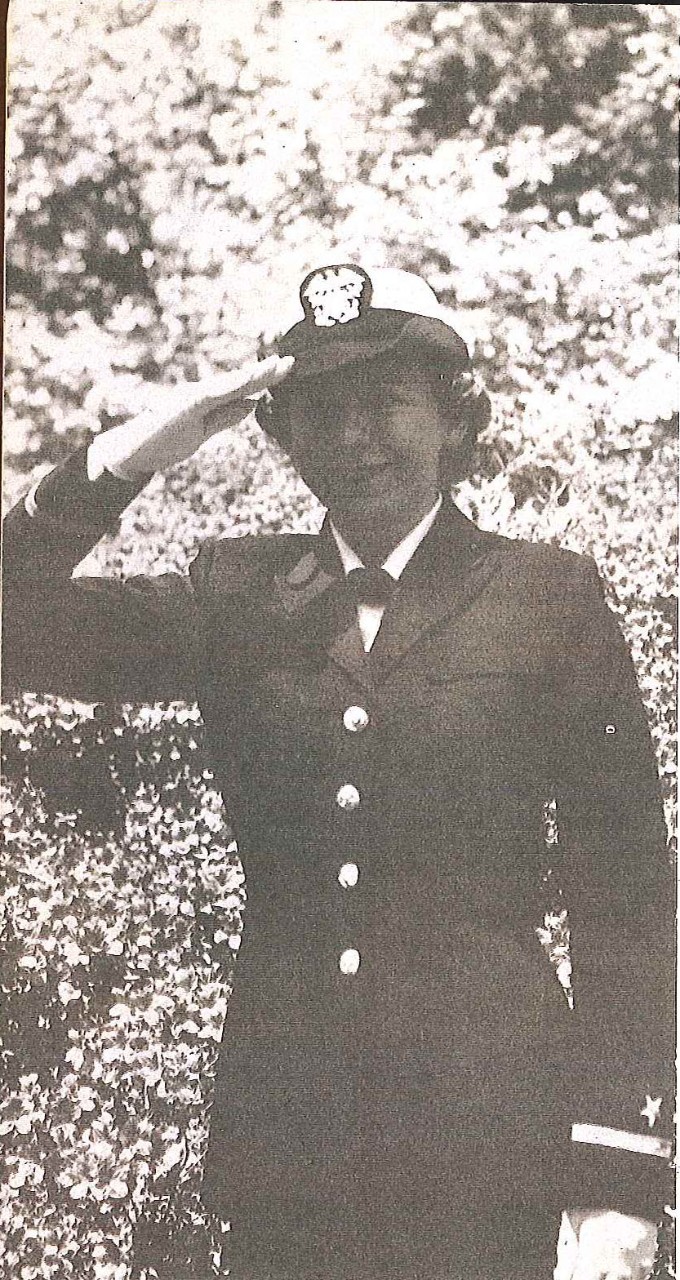
YOUR NAVY CAREER
THE NAVY has a program of career training designed to develop your individual abilities and potentialities. You have the chance to work at more than one type of job, broadening your experience and increasing your knowledge of the many facets of naval administration. You assume more responsibilities with each step upward, so that as a senior officer you will be prepared to undertake any one of a wide variety of duties in a mobilization emergency.
AS A LINE OR SUPPLY CORPS OFFICER, your initial commission was as an Ensign in the United States Naval Reserve. Some Medical Corps and Medical Service Corps officers are initially commissioned in higher ranks commensurate with their age and professional competence. However, for the most part, new officers start as Ensigns in the Naval Reserve.
If, as so many do, you wish to make the Navy your career, you will have the opportunity to apply for transfer to the regular Navy. Your performance of duty in your evaluated service period guides the Navy in accepting or rejecting your application.
Normally, after 18 months of service you are promoted to Lieutenant (junior grade).
THE FASCINATION OF NAVY LIFE
THE LIFE OF A NAVAL OFFICER is at once satisfying and fascinating. The variety of new places and faces, the satisfaction of an important job, the social life of naval stations, the cultural delights of the theatre, art galleries, musical organizations of the great metropolitan centers in which you may be stationed, all add up to a fascinating experience.
Socially, you have your choice of a wife variety of activities. Every naval station has its own officers' club, with its planned and impromptu gatherings. Dances, dress-up formals, tennis, golf, sailing, swimming, bowling—all compete for your leisure time. Naval officers, themselves, coming from all sections of the country, are refreshing company. There is no conformity to a narrow, restricting outlook. Rather, daily contacts provide a stimulating, broadening character growth leading to the truly cosmopolitan attitude.
LIVING ACCOMODATION are comfortable and pleasant. Normally, in metropolitan centers you may select your own living quarters, with your rental allowance defraying the cost. Where government quarters are provided, you will have your own room and will receive and entertain guests in a cheerful, homelike living room which you share with other women officers.
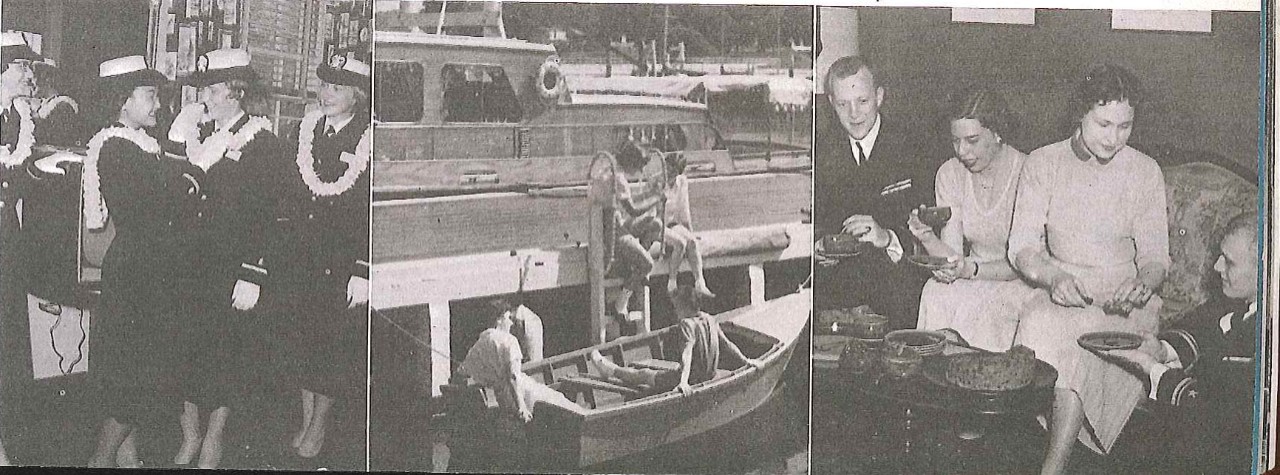

NO WORRIES
YOUR SALARY, allowances and additional benefits assure your financial independence. Your salary, which is the same as for male officers of your rank, increases automatically at regular intervals. And each promotion carries with it an increase in salary and allowances. As an Ensign you will receive a total of more than $4,000 a year. Included in this $4,000 is a subsistence allowance of $47.88 per month and a quarters allowance of $68.48. The latter is granted when government quarters are not provided.
However, this isn't all of the budget story. You receive the best of medical and dental care free while on active duty, and your salary and allowances go right on during illness. Every year you are on active duty you accrue 30 days of annual leave (vacation) with full pay and allowances. Your Navy commissary privileges and other fringe benefits complete a picture of security and freedom from financial worry.
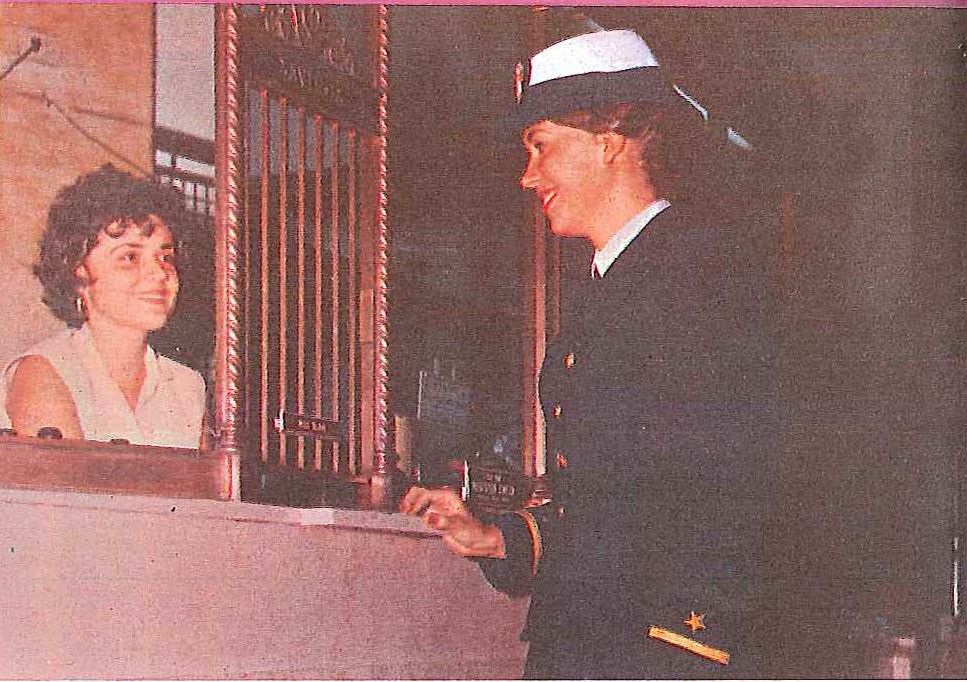

OVER YOUR BUDGET
Here is a compilation of the pay and allowances of a Navy officer without dependents, in the ranks of interest to newly commissioned women officers. The allowance for quarters is included, since this is usually paid in metropolitan areas:
| Ensign | Lieutenant (junior grade) |
Lieutenant (junior grade) (24 months) |
Lieutenant (48 months) |
|
| Taxable salary | $2,667.60 | $3,112.32 | $3,492.00 | $5,380.00 |
| Nontaxable | 1,395.36 | 1,499.76 | 1,499.76 | 1,600.56 |
| Gross income | $4,062.96 | 4,612.08 | 4,991.76 | 6, 980.56 |
Basic pay (taxable) is based on the rank of the individual and her years of cumulative service. After 48 months, automatic basic pay raises occur every two years until 20 years of service has been accumulated.
Quarters and ration allowances (nontaxable) remain constant for each rank, regardless of cumulative service. They are increased with promotion to higher rank. Quarters allowance is paid when government quarters are not provided.
Navy retirement plans involve no cost to the officer. Retirement after 20 years provides approximately 50 percent of basic pay in the highest rank held. Retirement after 30 years provides 75 percent.
A uniform allowance of $300 is paid on first call to active duty.
Expenses of moving household goods are paid by the Government upon changes of duty station, and to the location of the officer's choice upon discharge from active duty.

HOW YOU MAY
In order to obtain high caliber leaders, the Navy's standards for commissioned officers always have been high. You must be a citizen of the United States, and [sic] must meet educational and physical requirements. While for most programs you may be married or single, you may have no dependents under 18 years of age. In addition, you must demonstrate high moral standards and the capacity for leadership.
Special information for Line and Supply Corps officers:
AGE LIMITATION
You must be at least 18 and under 27 years of age at the time you submit your application for officer training. However, you must be at least 20 and under 27 ½ years at the time of appointment as an officer. In some cases, waivers will be considered for applicants who would be under 30 years at time of appointment.
EDUCATION
You must hold a baccalaureate degree from an accredited college or university, although you may apply for officer training as a college junior.
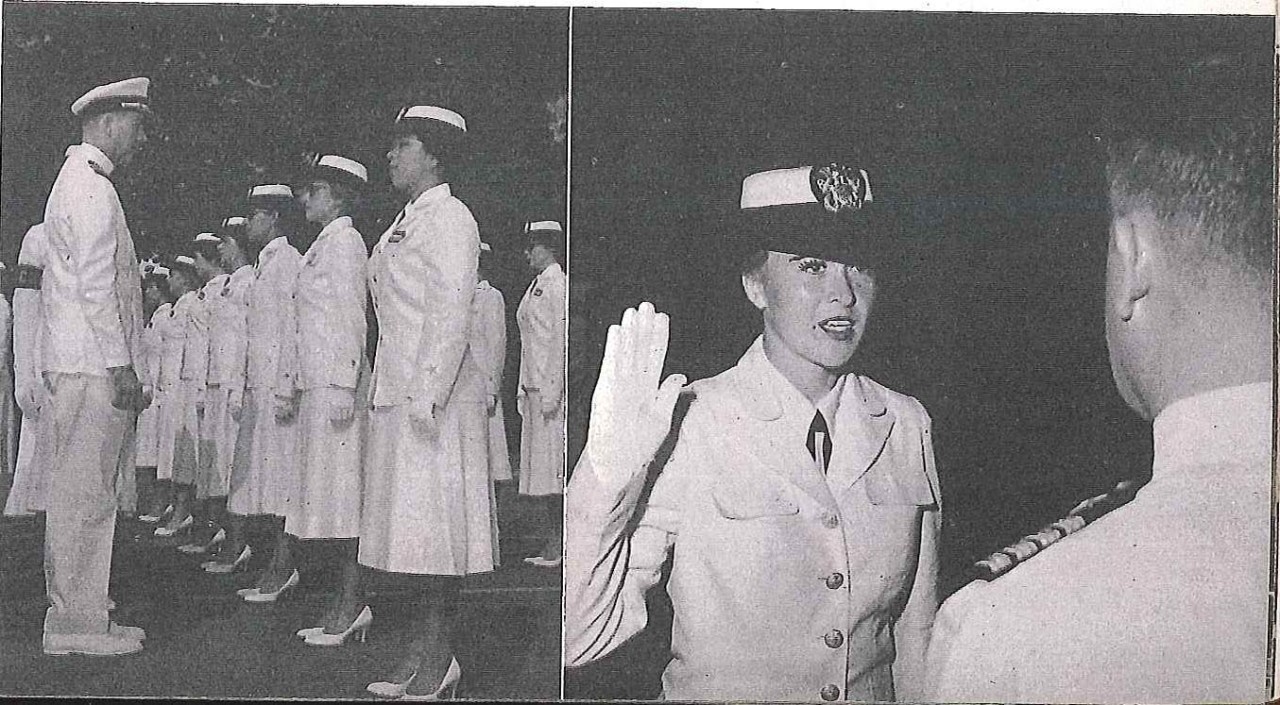
QUALITY AS A NAVAL OFFICER
OBLIGATED SERVICE
When you enter the program [sic] you agree to serve on active duty for 24 months following your appointment as an Ensign. After this period of active duty, if you so desire you may return to civilian life. On the other hand, during your period of evaluated service you have an opportunity to apply for transfer to the regular Navy.
Special information for Medical Corps officers:
If you are a graduate of a medical school approved by the American Medical Association and meet other professional standards, you may qualify for a commission as a woman medical officer. The grade in which you are commissioned will be determined by your age and professional experience. Orders to active duty will depend upon the needs of the service at the time of appointment. If ordered to active duty, you will receive, in addition to your regular salary, $100 per month inducement pay.
As a qualified fourth-year medical student, you are eligible to apply for a rotating internship on active duty in a naval hospital if you meet the following requirements.
AGE LIMITATION
With no prior military service, you must be at least 21 and under 34 years of age on the date of commencement of internship.
EDUCATION
You must be a fourth year [sic] student in a medical school approved by the American Medical Association. You must be a participant in the National Intern Matching Program, Inc. Full details of the matching program are available through your dean.
OBLIGATED SERVICE
You will be required to serve on active duty for the period of internship. Following this, you may volunteer for a minimum of 24 months active duty, if you desire.

Special information concerning Medical Service Corps:
Women are eligible for appointment in any section of Medical Service Corps. However, three fields have been designated as women's specialties: dietetics, physical therapy, and occupational therapy.
Women with an advanced degree (Ph. D.) are eligible for appointment as Lieutenant (junior grade); all others are appointed as Ensigns. Selected applicants will be required to complete an appropriate Navy indoctrination course.
WOMEN STUDENTS and interns in the field of dietetics, physical therapy, and occupational therapy may be appointed Ensigns and finish their school as Naval Reserve officers. Under this program, they receive full pay and allowances while completing their professional training. After an 8-week indoctrination course at Newport, they are ordered to their first permanent duty station. Details of this program are available at any Navy Recruiting Station.
Besides meeting the general requirements for appointment, women applying for commissions in the Medical Service Corps must meet the following special requirements:
AGE LIMITATION
You must be at least 21 years of age and under 31 ½ at the time of application for appointment as ensign, and under 33 years for appointment as a lieutenant (junior grade).
EDUCATION
Specific requirements are as indicated for the various specialties.
DIETETICS
You must have a baccalaureate degree from an accredited college with a major in foods and nutrition or institutional management. You must, in addition, have completed a dietetic internship. Three years of experience, one of which must have been gained in a hospital, may be substituted for internship,provided [sic] it included: diet, therapy, adequate menu, food preparation and service planning; food cost control and food supplies and equipment handling.
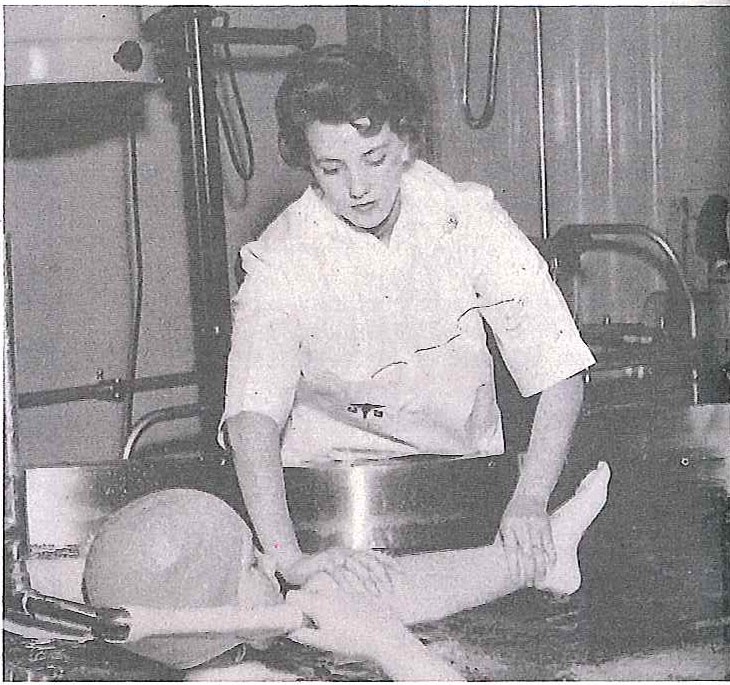
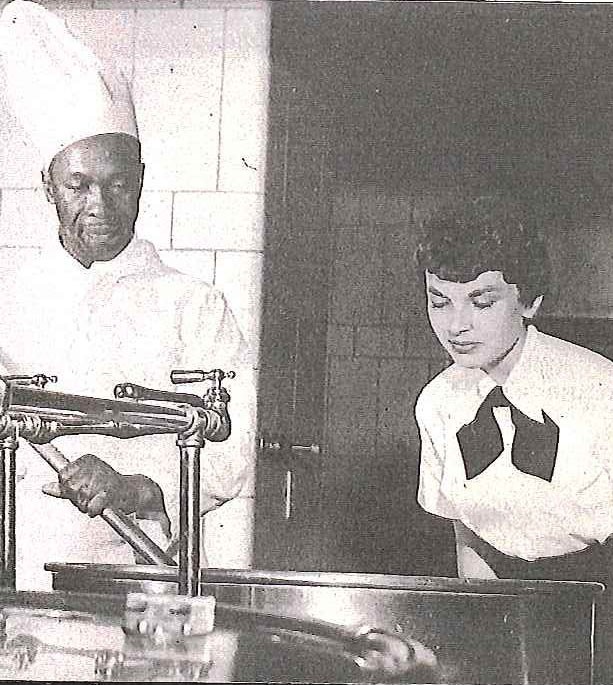
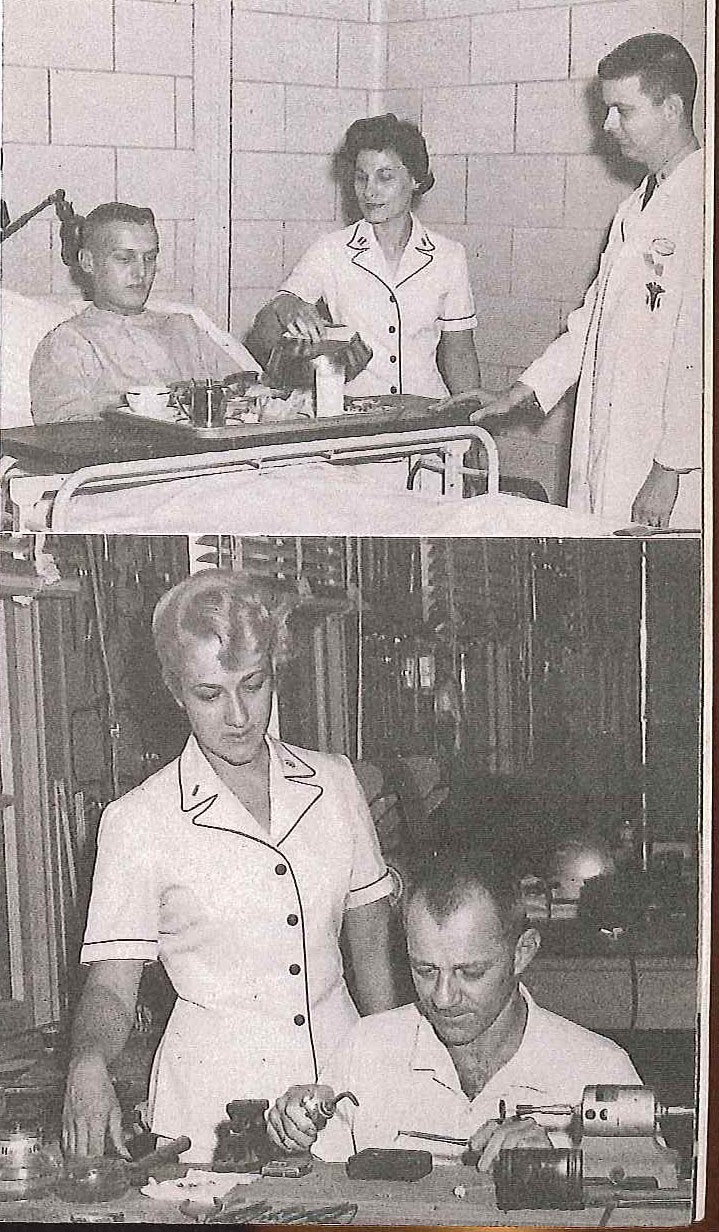
PHYSICAL THERAPY
You must have a baccalaureate degree from an accredited college with a major in physical education or the biological sciences. You must, in addition, have completed a physical therapy training course in a school accredited by the Council on Medical Education and Hospitals of the American Medical Association.
OCCUPATIONAL THERAPY
You must have a baccalaureate degree from an accredited college, or [sic] be a graduate of an accredited school of nursing. In addition, you must have completed an occupational therapy training course in a school accredited by the Council on Medical Education and Hospitals.
OPTOMETRY
You must have a baccalaureate degree from an accredited college giving a 4-year course of study at a professional level with a major in optometry or actively working on it, and [sic] must submit evidence of registration as an optometrist by one of the states or the District of Columbia.
PHARMACY
Requirements for appointment in the field of pharmacy are identical with those in the field of optometry (as above), except that the major must have been in pharmacy with evidence of registration as a pharmacist.
ALLIED SCIENCES
You must have a baccalaureate degree from an accredited college giving a 4-year course at a professional level. You must also have a minimum of 30 semester hours of graduate work in or relating to the specialty at an accredited institution, and [sic] must be either a full-time student in the specialty or actively working on it.
SUPPLY AND ADMINISTRATION
You must be a graduate of an accredited college with a baccalaureate degree and, in addition, must have completed an advanced course at an approved institution earning a master's degree in hospital administration.
OBLIGATED SERVICE
You must agree to remain on active duty for 2 years after reporting to your first duty station. Women students and interns must agree to serve on active duty while completing their last year of training and for 2 years after graduation.
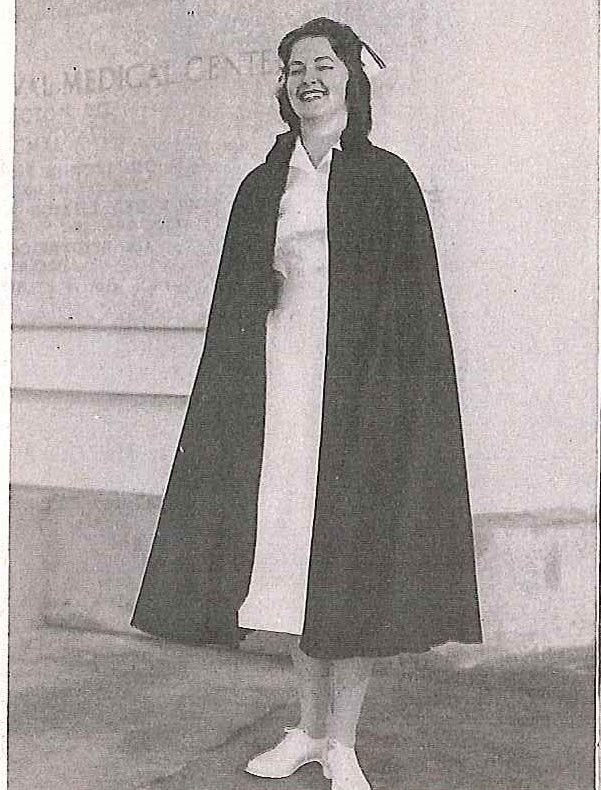

Special information concerning Navy Nurse Corps:
If you are a graduate, registered, professional nurse in good standing, you may be qualified for an appointment as a Reserve officer in the Navy Nurse Corps, with an opportunity for a commission in the regular Navy.
Navy nurses serve in dispensaries and hospitals at home and overseas, and aboard Military Sea Transport Service ships. Duty assignments run the full range of general nursing practice, and in such specialties as operating room management, anesthesiology, nuclear nursing, teaching, ward management, nursing supervision, and nursing service administration.
Applicants for Nurse Corps commissions must meet the following requirements:
AGE LIMITATION
You must be between 20 and 35 years of age when appointed.
EDUCATION
You must be a high school graduate with at least 15 unites of credit, and a graduate of a school of nursing offering a program of at least 3 years, which was approved by the appropriate state accrediting agency at the time the applicant completed her program.
Graduate registered professional nurse in good standing, and [sic] engaged in the ethical practice of nursing or participating in appropriate professional activities, and [sic] established professional fitness for the Nurse Corps by means of interviews and review of academic records and history of professional experience.
OBLIGATED SERVICE
When you accept your commission, active duty may be requested for a minimum of 2 years, beginning on the reporting date at your first permanent duty station. At the end of thus period, you may apply for transfer to the regular Navy for extension of active duty as a Reserve officer or return to civilian life.
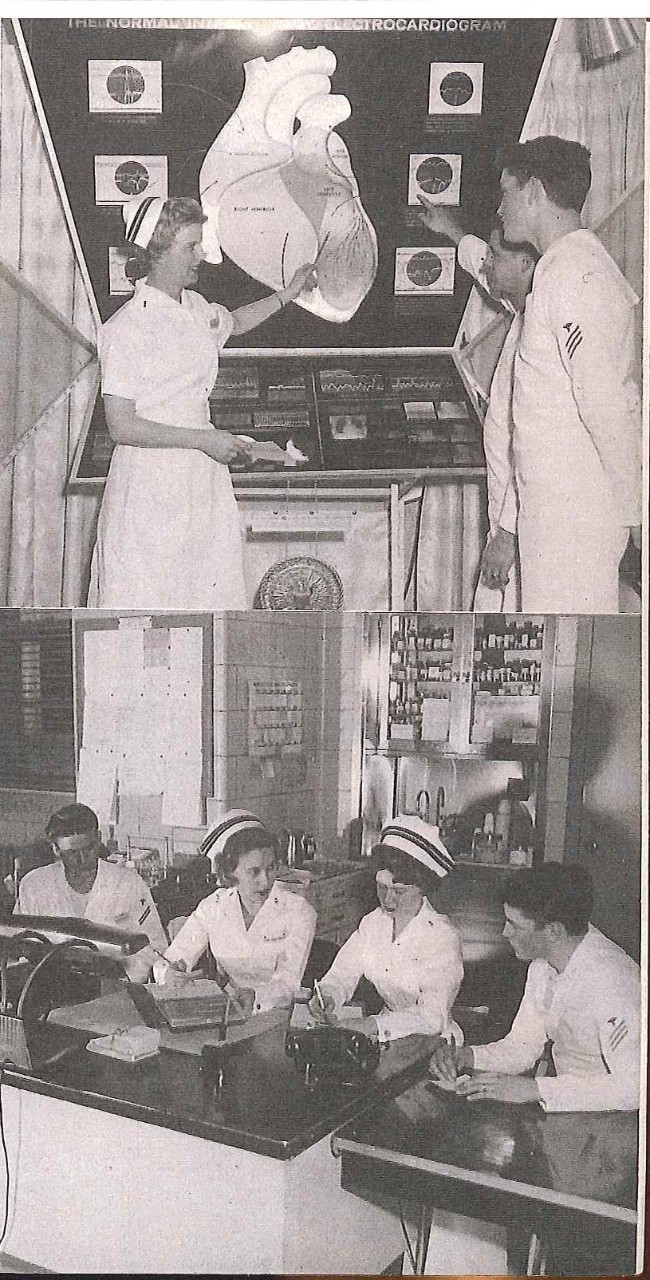
STUDENT NURSES about to begin their final year of study for a baccalaureate degree in nursing at an approved school are eligible for the Navy Nurse Corps Candidate program. The student will be paid $99.37 per month during her last year of school, and all expenses will be paid by the Navy. These included tuition, fees, books, and board and room when not furnished by the school.
Upon graduation, she will be appointed an Ensign in the Nurse Corps, U.S. Naval Reserve, and will be sent to the Navy Officer School (Women) at Newport for officer indoctrination. Upon completion of the course, she will be assigned to active duty in one of the large naval hospitals in the United States.
Like all other officer candidates, the student nurse must meet the requirements for citizenship, moral standards and capacity for leadership. She must be unmarried at the time of application and agree not to request discharge or submit resignation for reason of marriage during the period of training or active duty agreement. She must have no dependents under 18 years of age to whom she has not lost all rights and control through formal adoption proceedings. Other requirements are:
AGE LIMITATION
You must be between 20 and 28 years of age at the time of completion of degree requirements and appointment.
EDUCATION
You must be currently enrolled as a full time [sic] student in a basic nursing program in a university offering a baccalaureate degree in nursing, approved by the Accrediting Service of the National League of Nursing. You must be enrolled as a student free from any scholarship, grant, or contract which would preclude pursuing a naval career.
OBLIGATED SERVICE
You must agree to serve on active duty for a minimum of 2 years, commencing on reporting at your first permanent duty station after the 8-233i indoctrination course at Newport.
PARENTAL CONSENT
If you are under age 21, you must have the consent of your parents or legal guardian.
APPLICATIONS
Applications for the Navy Nurse Corps Candidate program may be made at any time after the first semester of the junior year in college.
